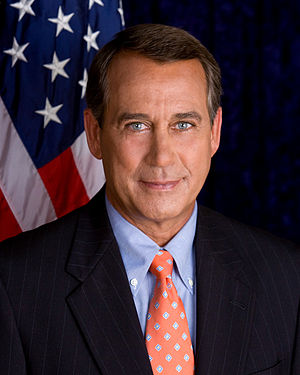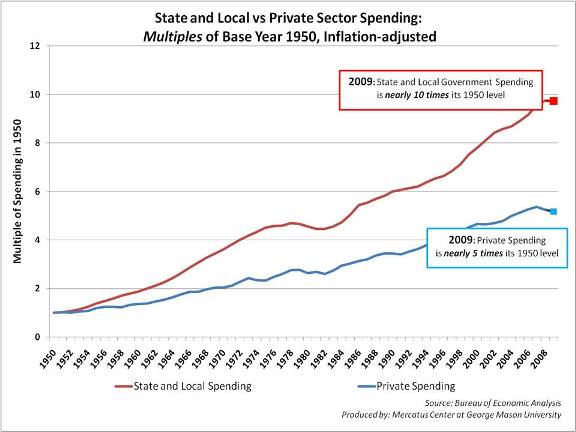Writing in
The Wall Street Journal, John F. Cogan and John B. Taylor explain why
The Obama Stimulus had no Impact (paid subscription). The entire article is good, but this one line identifies the failure of American Keynesianism:
...the federal government borrowed funds from the public, transferred these funds to state and local governments, who then used the funds mainly to reduce borrowing from the public.
Cogan and Taylor explain why the stimulus has been ineffective; however, they do not explore the broader issues involved. I see two such issues: the grant-writing industry and state balanced budget requirements.
The process of the federal government borrowing funds from the public only to turn around and give those funds to state and local governments has been going on for years. Often, those state and local governments put career "civil-servants" in grant writing
sinecures to try and secure federal dollars. In other words, state and local governments spend money on grant writers that might otherwise go to police, fire fighters, trash pickup, or something else, so that states and municipalities
merely have a chance to get federal grant money. It's the federal grant lottery—you buy your tickets with state and local dollars and you can only win if you've got a ticket! To increase your chances, just buy more grant lottery tickets! So the grant-writing industrial complex is the first problem.
But that's not the worst of it.
Is your state required to balance its budget? Almost certainly.
Every state (except Vermont) has a balanced budget requirement.
California will balance its budget.
There might be blood in the streets from the rioting that follows, but it will be balanced. In general, I'm a fan of balanced budgets; however, the states are balancing their budgets with the help of a disingenuous actor: the federal government. The feds have no balanced budget requirement, but they do have an insatiable appetite for more power. So what's been happening lo these many years, is that the federal government offers the states money to "fill the hole in the state's budget" while also attaching strings to the money that erode the sovereignty of the states and in so doing the feds effectively allow the states to run budget deficits by transferring those deficits to the federal government.
In other words, the federal government through its profligacy has made state-level balanced budgets meaningless while extending federal control over education, law enforcement, transportation, etc. There may be a role for the federal government to play in education, law enforcement, transportation, but the need at the state level to balance the budget has meant that the discussion about that role is one-way: the federal government tells the states what to do.
Until there's a federal balanced budget this problem will persist. Here are a couple of non-traditional approaches to balancing the budget. First, there's my proposal (written on Talk Like a Pirate Day) to run the government like the
Pirate Ship of State that it is. Another option would be to require all members of the House of Representatives
and their staffs to be paid out of the country's surplus. This second option is elegant because of both its simplicity and flexibility. In the event that the government needs to run a deficit, Representatives and their staffs would presumably be willing to make the financial sacrifice required and the American people would, I think, respond by passing the plate to provide some remuneration.
Note: In Missouri, about 30% of our budget comes from the federal government according to the
2009 Budget Summary. Missouri's 2009 Budget Summary also indicates that a third of our budget is supplied by "Other". The thing is, "Other" is not itemized. I have heard Missouri legislators assert that 60% of Missouri's budget is supplied by the federal government, so I wouldn't be surprised if federal dollars were routed through the "Other" category.

















